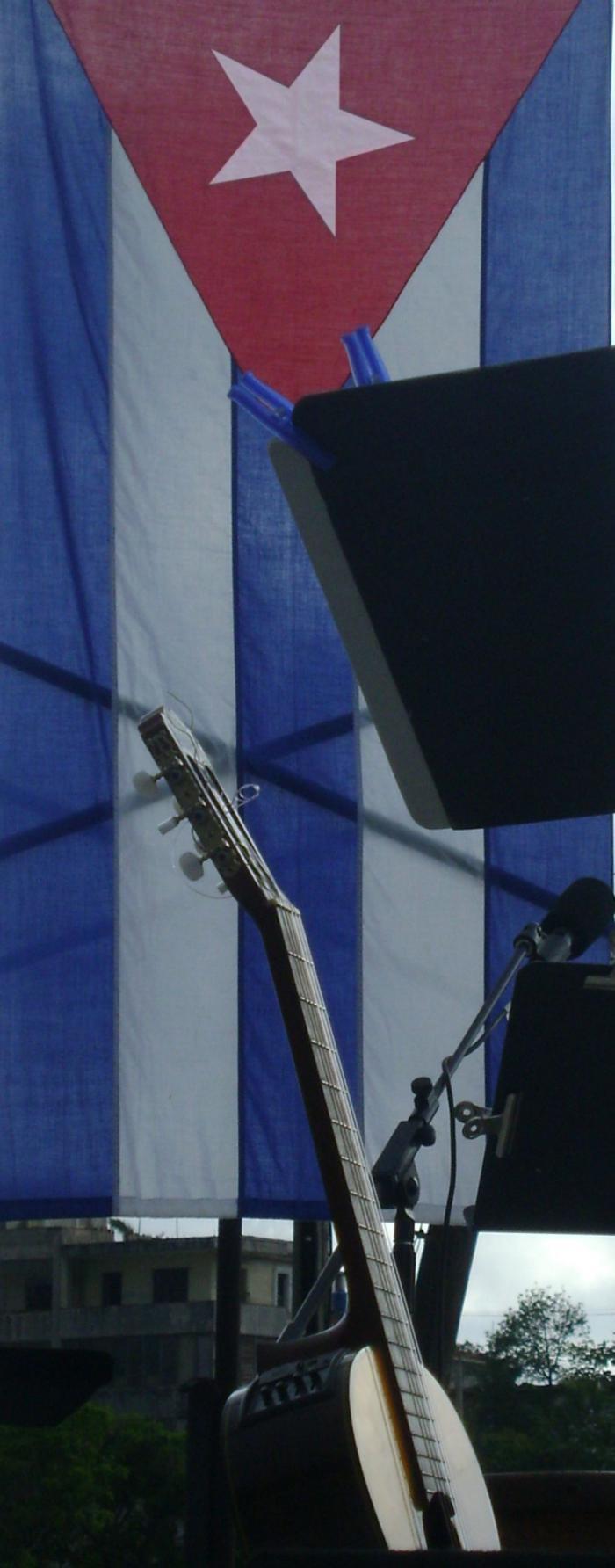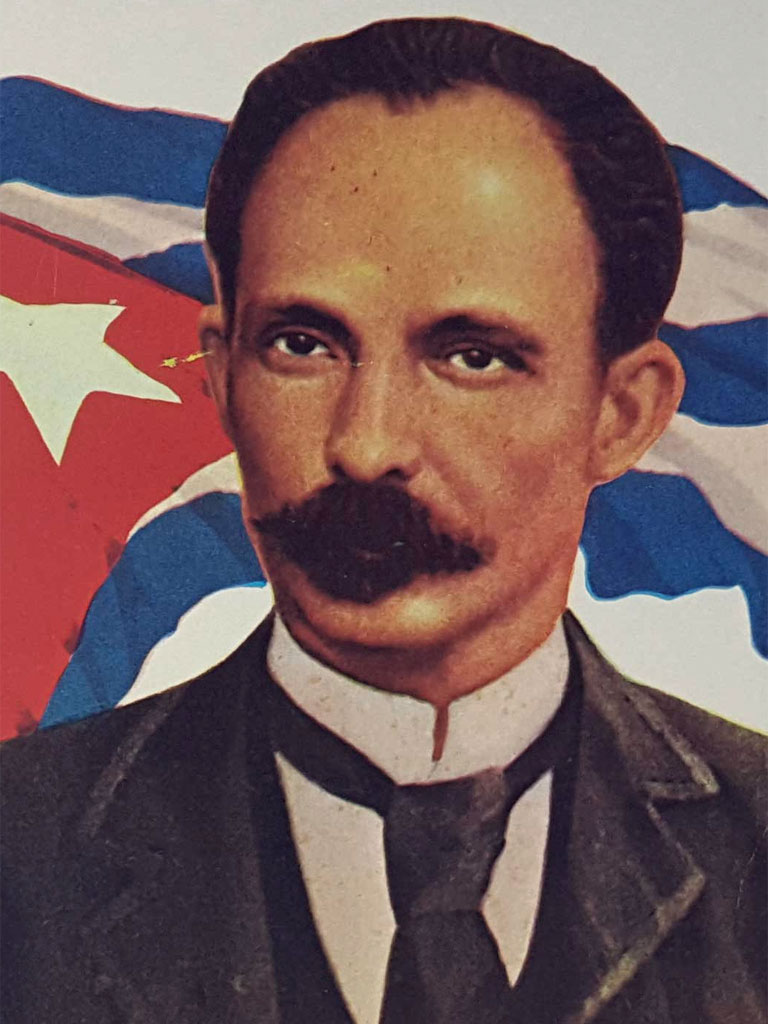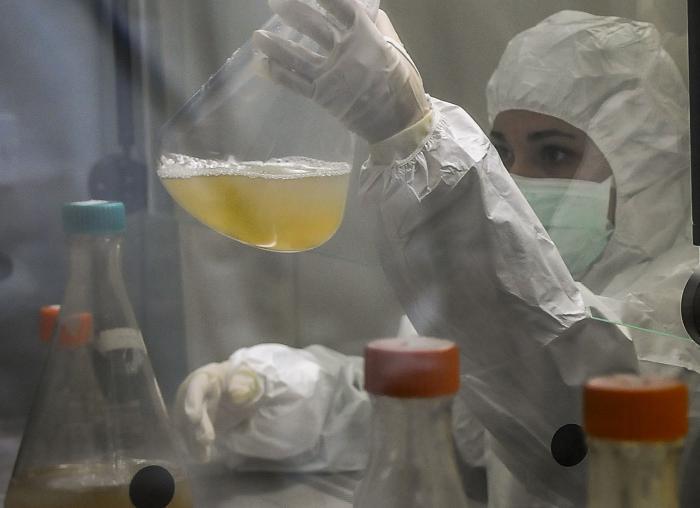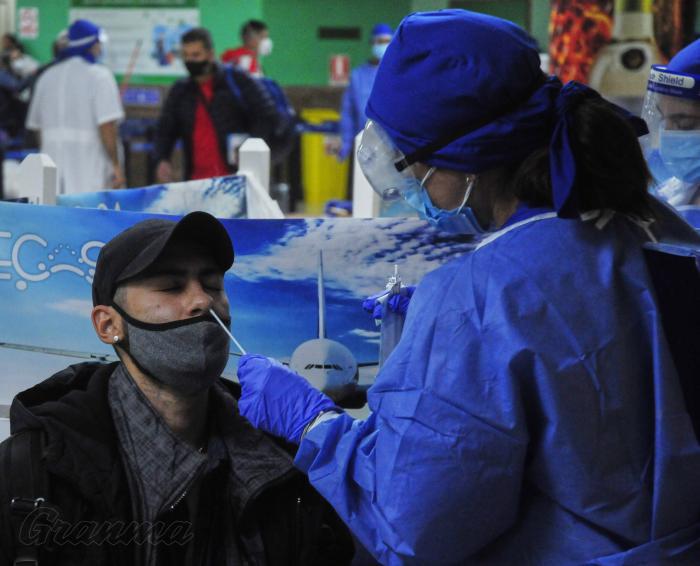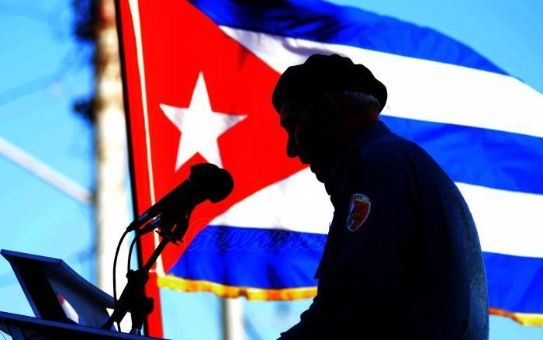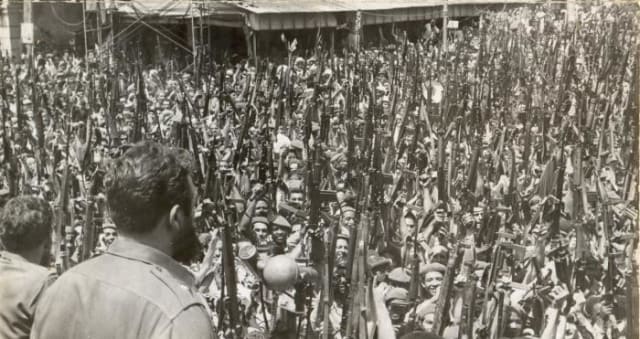THE COUP SCENE BEHIND THE SAN ISIDRO MOVEMENT
May 10 , 2021 , 2:23 pm .

Social networks and media magnify protests by the San Isidro Movement (Photo: AFP)
For many years now, the United States has sought a way to end the Cuban Revolution, unsuccessfully, and there are sufficient historical and geographical reasons to maintain that effort; on the one hand, its very existence as it was for many years a reference of anti-imperialist struggle and, on the other, that said process occurs in a nearby territory.
These events, the resistance of the Cuban people and other real and symbolic defeats constituted a stumbling block for the expansion of US influence on the island. Therefore, since the birth of the revolution, every opportunity has been seized to impose an agenda of regime change.
Since then, internal and external means have attempted to undermine the basis of the historical process that began more than 60 years ago.
A special report from the Samuel Robinson Institute for Original Thought (ISR) details the coup agenda behind the protests to reject the application of Decree 349 in mid-2018, "which sought to order nascent private cultural activity" in Cuba, and derived in current reactions that go beyond opposition to a legal instrument.
He points out that the current situation combines elements of old date that went "on the offensive within the framework of a regime change operation," as well as others that aim to psychologically dent the population.
MSI APPEARANCE AND THE PRELUDE TO THE CULTURE WAR
The artistic revolts of 2018 were the breeding ground for a collective that was supposed to capture the general social discontent to be formed. Since then, the San Isidro Movement (MSI), with methods similar to the color revolutions, has undermined social peace on the island and, from the artistic point of view, they turned to political activism as part of the Cuban dissidence against the Communist Party of Cuba.
According to the ISR report, since last year elements that are part of the germination process of a soft blow have been added. And it is that the arrest and subsequent sentence to eight months in prison of rapper Denis Solís for contempt quickly became a fact of public interest that the opposition tried to capitalize on to generate social pressure.
The report details that, after the rapper's arrest, “six of the 14 'artivistas' (artist-activists) of the MSI began a hunger strike as a form of protest while other members of the group gathered in a nearby park to hold vigils. , 'civic protest' campaigns through 'poetic whispers' (poetry readings) ”, alleged peaceful acts with which they initiate“ direct ”provocations (live broadcasts) through social networks and interpellations to the police officers who were guarding the spaces .
The coup agenda began to be exposed when the United States Charge d'Affaires in Cuba, Timothy Zuniga-Brown, began to directly support the revolt saying "the world is watching, the international community recognizes your peaceful protest," a message with which It sought to project an "urgency" that had to be covered by international media with a wide audience.
The provocations transmitted live on social networks and the massive diffusion by the American chargé d'affaires confirm a typical formula within the repertoire of soft blows: in the absence of its own projection, Zuniga-Brown fulfilled the function of attracting attention and achieve the swarm effect later managed from social networks and media. In this case "the international news brokerage acted as a multiplier effect of the ideas of the" movement.
Once the world was “aware of the situation”, it was enough that any detail, no matter how insignificant, became an update of the facts.
“On November 26, 2020, the necessary excuse to add followers was detonated when the police removed Carlos Manuel Álvarez, director of the newspaper El Estornudo , financed by the NED, from Otero's house. The authorities explained that there was a violation of sanitary rules: Carlos Manuel Álvarez had not followed the rules against covid-19 after arriving from abroad. Next, the group gathered around the “civic protest” campaign was presented on November 27 at the offices of the Ministry of Culture in an activity that was highly reviewed in local and international media, ”says the report that was written by Mission Truth.
Subsequently, members of the Hannah Arendt International Institute of Artivism (INSTAR) were added to the San Isidro Movement, with which the protest already acquired a hue of heterogeneity that symbolized the union of all sectors of Cuban society. This sort of constituted panel met with the government, which was seeking a solution through dialogue.
Seven plastic artists, five artists linked to the cinema, three writers, two members of the world of theater, a musician, five members of the MSI, four of INSTAR and three of opposition media made up the so-called G30 that met with representatives of the Cuban Revolution to discuss the previously agreed agenda. The points would be the following:
1) Review and transparency of the judicial process against rapper Denis Solís.
2) Freedom for the plastic artist Luis Manuel Otero Alcántara
3) Right to have rights, freedom of expression, free creation and dissent.
4) Cessation of defamation and discredit by the official media.
5) Recognition and respect for independent positioning.
6) No more police violence, no more political hatred.
"In addition, an agreement was established to maintain a channel for dialogue, but these were broken the following week and led to events associated with a larger effort where the link between the 'youth dissidents' is combined with conventional anti-Castroism and the usual the financing and promotion channels, which could be understood as an accumulation of force within the framework of a battlefield that is carried out fundamentally from 'the cultural' ”.
Now they were not just young people who were fighting for "culture", they also joined the Patriotic Union of Cuba (Unpacu), made up of political agitators directly linked to the traditional Mayan counterrevolution, to accumulate strength.
THE STRATEGY
As mentioned above, one of the strategies in the framework of the color revolutions is the overexposure of a subject until it becomes a trend. In the case of the aforementioned movements, both have been promoted by the US press, "whose operation consists of saturating their web pages and social networks with facts derived from the provocations of their operators to the security forces and government officials."
The hunger strike of some activists in Santiago de Cuba was an event that was widely followed by these media. José Daniel Ferrer García, José Daniel Ferrer Cantillo (Ferrer García's son) and Liusban John Utra were the most controversial UNPACU strikers who attracted attention by claiming to be victims of a police siege by the local authorities.
Although they identify themselves as “non-violent dissidence”, some of their participants have medical records that question this self-perception. Such is the case of Ferrer García, who provoked the threat of the European Union to break relations with the island after attacking himself in the middle of a statement to the Cuban security forces with the intention of denouncing ill-treatment and torture.
But this show by Ferrer García is not accidental: “the Cuban government accused him of receiving up to $ 50,000 from the powerful Cuban-American National Foundation based in Miami, he created the Patriotic Union of Cuba in August 2011 after being released in March of that year. They claim to have more than 10,000 affiliated activists and 122 cells ”.
They reiterate that activism "is based on resistance and non-violent disobedience", but remember that this is one of the principles of the color revolutions according to the Gene Sharp manual.
INTERNATIONAL RECOGNITION
Another common feature of the manual revolutions found in the Cuban protests is the recognition of human rights NGOs that operate globally. For example, Amnesty International (AI) has recognized UNPACU since its inception. That is why it is not by chance that they are internationally awarded and recognized as examples of struggle. That Ferrer García denounces harassment and intimidation after the arrests that its members have suffered by the Cuban authorities is a way of indicating that this recognition and what it represents is being undermined.
"The Ferrer García product has enjoyed the publicity that awards and distinctions such as the Truman-Reagan Freedom Prize by the Victims of Communism Memorial Foundation 2020 can confer on it (it should be remembered that Adrian Zenz, the main expert with whom the West relies to denounce the Uyghur genocide belongs to this organization), XIII International Human Rights Prize of the Hispano-Cuban Foundation, based in Madrid, and the NED Democracy Prize ", details the ISR.
However, the acknowledgments are not enough to be exempt from the criminal record that this activist has accumulated since 1993, which includes, in 2019, a kidnapping of a Cuban citizen for which he was arrested.
All the times that Ferrer García has denounced torture and lack of medical attention, the government has shown that it is a show "to amplify the media impact of his actions." And it is that this staging has the objective of moving the axis of the soft coup from the "cultural" to the political-diplomatic sphere:
"Last February he was detained for 10 hours and both the newly launched Biden administration and the vice president of the European Parliament, Dita Charanzová, called for his release, marking a much more direct involvement," the report says.
For this character the important thing is to stay under the focus of the media and he will do anything to keep the attention. Before his arrest, he was involved in a violent event during a propaganda activity in which a distribution of food to the population hit by the "economic crisis on the island" was used as an excuse, obviously without mentioning the cause: the criminal bloc of USA.
The image that has been built around this activist has served to make him an example of struggle and others join the hunger strike, of which “ADN Cuba and CiberCuba promoted an exaggerated account of the physical damage caused by the decompensation". On the other hand, this hunger strike is questioned because some of its participants, including Ferrer García, have been seen with food and supplies.
Another who has applied the formula is Luis Manuel Otero Alcántara, who last Saturday, April 3, said that in Santiago de Cuba there were 50 people on hunger strike because they felt overwhelmed and abused by the island's authorities. This in connection with an activity that was organized to celebrate the anniversary of the San Isidro Movement with children that ended in insults to the authorities and the corresponding arrest of Otero again, facts that the press framed and magnified.
AGAINST DECREE 349?
Although the reason why several of these artistic movements were organized since 2018 was the rejection of Decree 349, which they tried to project as a form of State control over art and other expressions of creativity, today the motivations are different because said decree was never implemented.
The MSI, ―which has its original nucleus in the so-called 27N group, made up of artists and intellectuals who organized the day after the police raided Otero's house in San Isidro on November 26, 2020― calls itself “a avant-garde movement with incidence in the protection, promotion and defense of civil and cultural rights in present and future Cuba ”.
“They met in front of the offices of the Ministry of Culture and, amid calls for dialogue by the government, took advantage of the event to create a showcase effect for the benefit of the movement, since they frustrated the viability of dialogue and did not know the mediator governmental ”, says the ISR.
This shows that the demand for the regulation of cultural activities and a possible dialogue with the government to get out of the crisis went to a lesser level. The not-so-hidden agenda is the long-awaited change of government, expected for more than half a century.
FINANCING SOURCES
As is well known, there is no funding for US offices without interests behind those motivations that include scholarships, grants, and other training. According to Martha Lidia Ferreira ―the report collects― the economic support and stimulation of the protests in Cuba comes from enclaves such as the Cadal Foundation (Center for the Opening and Development of Latin America), whose resources come “from the hands of the branches of the CIA for the region; the Atlas Foundation (linked to the Koch brothers), the Fupad (Pan American Development Foundation), USAID and the NED ”.
Other organizations that serve as a hinge between gringo institutions and their operators in Cuba are the Institute of Peace and War Journalism, Factual, Distintas Latitudes, Swedish Human Rights Foundation, Hypermedia Editorial, Diario de Cuba, Cubanet, Sergio Arboleda University , as well as other NGOs abroad, generally in the US, that finance media that call themselves "independent or alternative." These include CiberCuba, DNA Cuba, Cubans around the World, Cubita Now, Cubanet, Periodismo de Barrio, El Toque, El Estornudo and YucaByte.
ADVERTISING SPOT AND CONTEMPT FOR AUTHORITY
Since everything that revolves around MSI is advertising, it was to be expected that it would have its own jingle that would act as an anthem for the justified and “spontaneous” “struggle” that they carry out in Cuba. The song “Patria y vida”, performed by several Cuban musicians living in Miami together with members of the movement who live on the island, is promoted by the media bent on the regime change agenda.
That same advertising logic was applied on April 4 when an attempt was made to arrest rapper Maykel Osorbo, one of the jingle's performers, and he escaped from the authorities under the gaze of many phone cameras. An attempt was made to promote that the rapper had escaped with the help of alleged neighbors and that they were actually agitators trained for those situations.
As always, the situation turned into a show that ended in insults against the president of Cuba and with the projection that the MSI is supported by the people and the unrest is widespread, in addition to that with their "help" they can outwit The authorities.
And the curious thing about all this is that the agitation of these movements was magnified at the end of March just when the annual human rights report was published, which denounced "torture of political dissidents, extrajudicial executions and other abuses", as well as "restrictions" by the Cuban government to freedom of expression.
CUBA AS AN EXPOTARDOR OF "REPRESSION"
It is not by chance that countries that do not bow to the designs of imperialism always appear as evil factors. In this case, Cuba is portrayed as an actor in the region that exports "techniques of repression" to Venezuela and Nicaragua.
With certain synchronicity ―referring to the report― Erika Guevara-Rosas, Amnesty International representative in Latin America, denounced the “latest repressive acts against opponents” that occurred in Cuban territory and directly attacked Cuban President Miguel Díaz-Canel.
In that same "coincidence" a videoconference was held in which "the repression" was condemned and they showed "concern about the situation of the strikers." In this interactive meeting, personalities from US and European politics who defend Unpacu participated, including Cuban-American congresswoman María Elvira Salazar and the vice president of the European Parliament, Dita Charanzová. "Europe is with you," said the MEP.
“Also present were leaders of“ anti-Castroism ”(USAID payroll) such as the secretary of the Cuban Democratic Directorate, Orlando Gutiérrez Boronat, who has expressed his support for an armed invasion of Cuba to overthrow the socialist government if Cuban soldiers use lethal force. against Cubans who oppose the government, ”says the ISR.
OLD AND NEW ACTORS AGAINST THE CUBAN REVOLUTION
Although the objective is the same, this time elements of old and new data converge that are combined with the positions of the politicians mentioned above. In this triangulation, the novelty of social networks as a speaker is justified. That is why the performance projected by the artistic movements of Cuba have a lot of resonance, even more so if it is combined with the old and worn-out Mayan opposition.
It is quite plausible that from this point of view they want to oppose the Cuban Revolution, seen from now on as an element of the past and whose symbolic value has become blurred in recent generations because they did not experience it, in the face of the novelty of the new technologies. of information and its air of modernity.
That is why it is not by chance that the attempt to change the regime is marked by a "renovating" air that is committed to a "better future".
And it is not possible to deny that there are events on the island that contribute to the consolidation of these ideas. "The historical change in political leadership, the experimentation of an emerging private sector and the arrival of the massification of telecommunication technology has had a significant and broad impact on the population, the report says.
It is inevitable that in view of these scenarios, the regime change manuals adapted to the new circumstances will be activated and conflicts will be exploited according to the weaknesses that arise.
“We are witnessing an update in the mechanisms, methods and modes of intervention. Any harmonization [from the United States to Cuba] at this time is totally illusory. With what is already being placed as the label 'normalization' in the Cuban socio-political environment, the minimum operating conditions that could facilitate the idea of a 'Cuban spring', a test tube revolution, will be inoculated ”, was a hypothesis of this platform in 2014 regarding the Obama administration's rapprochement with Havana, the ISR reviews.
Since then, and according to the panorama that was presented, there was time for the attempt to promote a color revolution on the island to be perfected. The common aspirations of the new generations have been channeled and instrumentalized in a diffuse global scenario marked by sudden and accelerated changes.
The claim of this artistic sector through the classic genres of social denunciation - rap, for example - remains out of context if the economic and financial blockade by those who finance, ironically, these movements is not taken into account. the island.
With this internal panorama, the old positions against the island are radicalized. Especially if Cuba belongs to the so-called axis of evil, made up of China, Russia, Venezuela, Nicaragua, among others, which represents the necessary enemy that the US uses to justify its intervention policy.
"Be it Obama, Trump or Biden, the sign that best unifies them is that of the mechanical repetition of the aggression patterns and the points of interest where they are exercised," says the Robinson Institute, while noting the increase in the dangerousness of the MSI's actions based on the regime change agenda and the turns it can take according to other experiences at a global level.
Imperialism will seek a way to break the affective bond between the population and the Cuban Revolution, the same one that gives heroism and resistance to a people that does not allow itself to be bent despite pressure and vicissitudes. As the Robinson Institute for original Thought says, "the MSI is the chronicle in present time of how (new) devices of social disintegration and conflict are articulated" taking advantage of the global context, that is why it cannot be lost sight of.
https://misionverdad.com/globalistan/el ... san-isidro
Google Translator
***************************************************
The prodigal son, the godmother... and the latest farce against Cuba
Fake hunger striker Luis Manuel Otero Alcántara sought attention at Calixto García University Hospital, where he was examined and no signs of malnutrition were found
Author: José LLamos Camejo |
informacion@granmai.cu
may 7, 2021 14:05:26
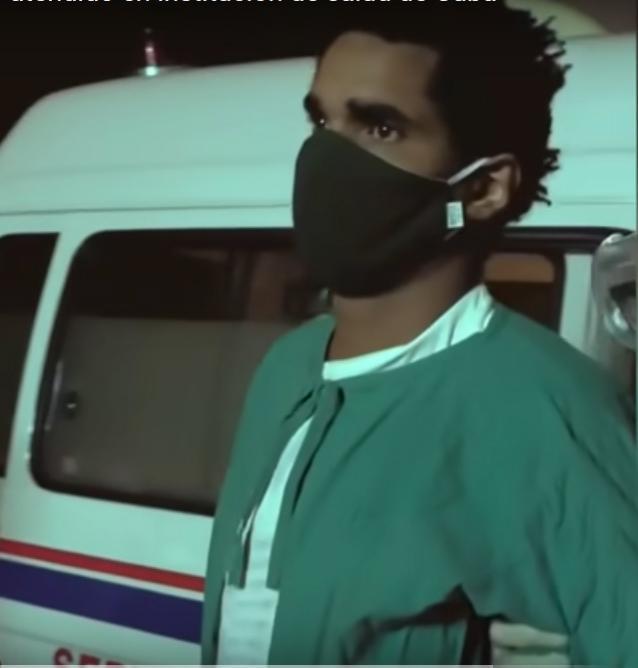
Luis Manuel Otero Alcántara was received at Calixto García University Hospital’s Emergency Center, after arriving in public health transport, conscious and walking without difficulty. Photo: Screenshot
The innocent glance turned to one of surprise, just like the tone of the response: "Elementary school classes at this time of day! The comment, however, is not attributable to the ten years of age of the person speaking.
The reaction of any adult not carefully watching the TV would be similar to Maria Carla's, when he or she heard the amplified voice offering the “elementary” explanation: "Look, here’s something important, when you count one, two, three, with your fingers, you start."
This is the level of detail of the instructions that salaried puppets in Cuba receive from abroad, on how to create or simulate disorder and chaos in our country, and thus give credence to the unsubstantiated slanders, with which they attempt to justify all variety of aggressions.
The "teacher" who María Carla heard on Cuban television’s Nightly News was none other than Karla Velázquez, a Venezuelan resident in Mexico, expert in projects and head of the Cuba Program for the National Democratic Institute (NDI).
The NDI is a non-governmental agency in the United States that finances groups of individuals to carry out subversive, destabilization plans in progressive countries, which has lately been focusing its attention, in particular, on Cuba and Nicaragua.
The voice of the aforementioned person was broadcast on television as (another) piece of evidence regarding what and who are behind the San Isidro comedians disguised as political dissidents.
It turns out that in the broadcast "class," Ms. Karla Velázquez had on the Cuban end of the phone line a crony of the "artist" Luis Manuel Otero Alcántara, her "godson," expert in mounting farces, and she was giving him detailed directions which he was to convey to Otero, in the name of "La madrina, because that’s what he calls me, too, and the police don’t know it."
Before giving the orders, she offered a brief conceptual brushstroke, taken from the U.S. Army manual on unconventional warfare, outlining how and why a hunger strike is conducted, plus how to film it with cell phones, and reminded her puppet - I mean, her godson, subordinate – of an important detail: "I direct you."
Her exact words were: "The first thing is that a hunger strike has demands, it’s a method that can be successful if one does it well. To do it well you need to have some demands; the first one should be the easiest to meet, so that you don't die of hunger, because you don't want to die. So the three demands I’ll send in writing to Afrik (Africa Reina on social media, the counterrevolutionary named Yenicelis Borroto Vega), so you can tell him."
The material and arguments presented to Cuban television viewers by journalist Humberto López include other images and audio recordings, which leave no doubt, if anyone has any, about the anti-Cuban scheme, which is not unknown or new, but continues, from one failure to the next.
Otero Alcantara is far from being the artist he pretends to be. Art, regardless of ideology, is respectful and authentic, and it is art; elements that this character's work lacks.
He starred in one of his most offensive, grotesque "performances," shamelessly desecrating our flag. This is not the only obscenity in public places of which, in the name of art, he has been the author.
At the end of November, in the company of others of his stripe, he simulated a first "hunger strike," which was almost immediately exposed, since his food bills came to light through the online shopping app TuEnvío.
In his latest "strike," which began at the end of April, following instructions from "The Godmother," Otero Alcántara has enjoyed the backing of the always-ready private media, at the service of the Cuban Revolution’s enemies.
With respect to the most recent chapter in the farce, Cuban television reported that on April 30, a small group of ten delinquent provocateurs, disguised as dissidents, put on another show, this time on Obispo Street in Havana.
The report indicated that the thugs, with a view toward gaining media visibility, chose a crowded site, a line outside a store. They planned to march to Otero Alcantara's home, although this was not their real interest, which was to please their mentors and receive a miserly monetary reward. Step by step, they are following in detail the U.S. Army’s 2019 unconventional warfare manual, as outlined as Action 29 in that document, referring to symbolic acts, and number 166 which proposes blending in with the public to create confusion.
The ringleader of this last provocation, Esteban Rodriguez Lopez, who is unemployed and lives in Old Havana, has a "brilliant career" as a criminal. His relationship with antisocial elements is well known; he has been convicted of illicit economic activity, reception of stolen property, theft, misappropriation, robbery with violence, assault, disturbing the public order, and resisting arrest, among other crimes.
Also presented on Cuban television was the audio of an individual of Cuban origin resident in the U.S. state of Texas, reporting that he was collecting money to send it to his people in Cuba, explaining that Esteban had already received dollars, and that people over there were collaborating with him, here.
Nonetheless, how different is the Cuba they attempt to sell, floating endless slanders and falsehoods, staged in theater performances, and the Cuba which, displaying the supreme humanity of its health system, does not discriminate against anyone who requires medical attention, as was the case at Havana’s Calixto Garcia hospital, on the morning of May 2, when one of the leaders of the so-called San Isidro Movement arrived: Luis Manuel Otero Alcantara, himself
The information issued by health authorities speaks for itself.
The first report indicated that, in the dawn hours of May 2, 2021, the citizen Luis Manuel Otero Alcántara was received at General Calixto García University Hospital’s Emergency Center, after arriving in public health transport, conscious and walking without difficulty, where he cited voluntary starvation as the cause of his concern.
"Upon physical examination, no signs of malnutrition were found, with the presence of normal clinical and biochemical parameters,” the report stated, while noting “ As established by the medical care protocol for COVID-19, an antigen test was administered, with negative results, and a PCR test sample was taken, with results pending."
This first note concluded that, following his arrival at the institution, and during the entire process, he remained cooperative with the health personnel attending him; that his condition was stable, and established medical measures were being taken by a group of specialists. The message clarified that the patient was kept under observation due to the reasons that brought him to the institution.
A subsequent, more detailed communiqué was released after clinical laboratory tests had been completed, with citizen Luis Manuel Otero Alcántara exhibiting entirely normal parameters; clear evidence that the patient's condition was not indicative of starvation, revealing, on the contrary, that he was well nourished and hydrated:
-Hemoglobin 16.8
-Glycemia 5.6
-Uric acid 9.71
-Blood Ph 7.15
-Hematocrit 0.51
-Platelets 300
-Leukocytes 7.8, with normal range differential
-Erythro 5, with normal sedimentation and creatinine.
Do we need better arguments? The foundation of this counterrevolutionary set-up is declared false, given what can be seen with the naked eye and under the microscope. There is no credible argument to support the veracity of these plots, invented one after another. The godchild, the godmother and her godparents, have exposed themselves, once again, to ridicule.
These stagings, with good reason, generate strong comments - on the side of the sensible, of revolutionaries who do not believe the stories of these poor devils who sell their country at the price of any handout in dollars - like the punch delivered by communicator Omar Rafael García Lazo:
"There is no serious mercenary who has a different basic premise than the one prioritizing his own life. As a worker, of cynicism in this case, the mercenary’s salary is most important, not the cause, much less the ideas. Yesterday the ‘artist’ was dying on us. Today he walked into the hospital with no sign of malnutrition. This is why no one believes them... But the show must go on. The truth is not even secondary. Surely they will say that the "artist" was forced to go. Surely he is continuing his "strike" in the hospital, like that wasted character who no one remembers anymore, champion of the assisted hunger strike in hospitals, at the expense of the public treasury. What a contradiction.
"The most pathetic part of the sequence is not the "striker" in good health, or his cheerleaders on Obispo Street, the out-of-focus press, or the Yankees clamoring for their puppet. No. They are already just part of the landscape.
"The most pathetic thing is to see a few thinking Cubans wagering their intellect on the political outcome of a foretold farce. Spuriously raising: what about the dialogue, what about the causes of the phenomenon, the underlying racism, a collection of arguments and ideas to consider, what about the future and democracy... Everything now stuck in an old pot that can’t take the pressure no matter how many advisors add their two cents. Nothing that resembles our authentic ajiaco, will come out of it, simply because, money has never been, in the case of Cuba, a catalyst for change. Never in our history."
http://en.granma.cu/cuba/2021-05-07/the ... ainst-cuba
